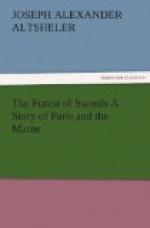Not feeling sleepy yet he decided to have another look about the house. A search revealed a small box of matches near the lamp on the shelf. Then he closed the window in order to shut in the flame, and, lighting the lamp, pursued his investigation.
He found in the kitchen a jar of honey that he had overlooked, and he resolved to use a part of it for breakfast. Europeans did not seem able to live without jam or honey in the mornings, and he would follow the custom. Not much was left in the other rooms, besides some old articles of clothing, including two or three blue blouses of the kind worn by French peasants or workmen, but on one of the walls he saw an excellent engraving of the young Napoleon, conqueror of Italy.
It showed him, horseback, on a high road looking down upon troops in battle, Castiglione or Rivoli, perhaps, his face thin and gaunt, his hair long and cut squarely across his forehead, the eyes deep, burning and unfathomable. It was so thoroughly alive that he believed it must be a reproduction of some great painting. He stood a long time, fascinated by this picture of the young republican general who rose like a meteor over Europe and who changed the world.
John, like nearly all young men, viewed the Napoleonic cycle with a certain awe and wonder. A student, he had considered Napoleon the great democratic champion and mainly in the right as far as Austerlitz. Then swollen ambition had ruined everything and, in his opinion, another swollen ambition, though for far less cause, was now bringing equal disaster upon Europe. A belief in one’s infallibility might come from achievement or birth, but only the former could win any respect from thinking men.
It seemed to John presently that the deep, inscrutable eyes were gazing at him, and he felt a quivering at the roots of his hair. It was young Bonaparte, the republican general, and not Napoleon, the emperor, who was looking into his heart.
“Well,” said John, in a sort of defiance, “if you had stuck to your early principles we wouldn’t have all this now. First Consul you might have been, but you shouldn’t have gone any further.”
He turned away with a sigh of regret that so great a warrior and statesman, in the end, should have misused his energies.
He returned to the room below, blew out the lamp and opened the window again. The cool fresh air once more poured into the room, and he took long deep breaths of it. It was still raining, though lightly, and the pattering of the drops on the leaves made a pleasant sound. The thunder and the lightning had ceased, though not the far rumble of artillery. John knew that the sport of kings was still going on under the searchlights, and all his intense horror of the murderous monarchies returned. He was not sleepy yet, and he listened a long time. The sound seemed to come from both sides of him, and he felt that the abandoned cottage among the trees was merely a little oasis in the sea of war.




